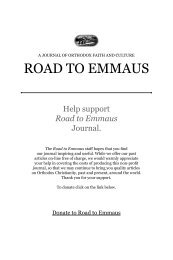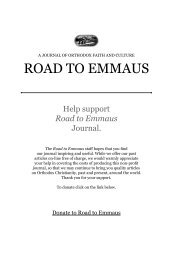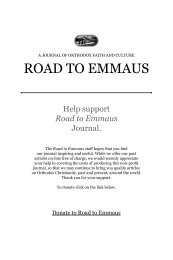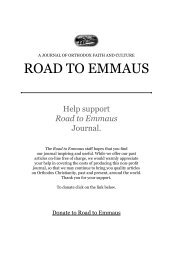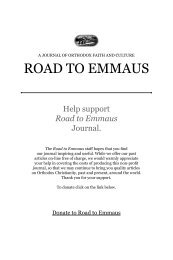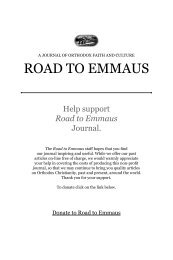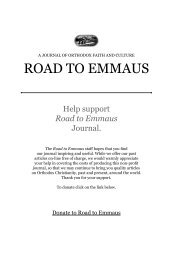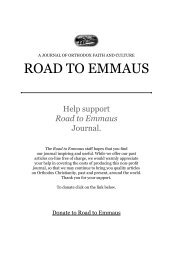RTE No 20 Interior - Road to Emmaus Journal
RTE No 20 Interior - Road to Emmaus Journal
RTE No 20 Interior - Road to Emmaus Journal
You also want an ePaper? Increase the reach of your titles
YUMPU automatically turns print PDFs into web optimized ePapers that Google loves.
<strong>Road</strong> <strong>to</strong> <strong>Emmaus</strong> Vol. VIII, <strong>No</strong>. 4 (#31)FAITH UNSEENing standards of law, medicine, and academics. Often more educated thantheir Muslim conquerors, they were necessary <strong>to</strong> the administration of theOt<strong>to</strong>man Empire.In the 16th century, however, Muslim fanaticism arose. Constantinople(<strong>to</strong>day’s Istanbul 2 ) was no longer so closely watched by the EuropeanChristian countries which were fighting their own wars, and the Turks dividedthe country in<strong>to</strong> regions, each under a terebey – a landlord. Each terebeywas a despot. If the terebey was good, his subjects lived in relative peace; ifnot, they suffered. But whether the terebey was good or bad, each one waschosen as a devout, even fanatic Muslim. The religious <strong>to</strong>leration of SultanMehmet II was forgotten, and oppressive taxation and violence againstChristians increased.The main square of Trabzon is still called Gavur Meydani (The Square ofthe Infidels). Why? Because it was during this difficult time in the 16th-17thcenturies that the farmers around Maçka attempted a revolt. Knowing thatFriday was the Muslim day of prayer, they came <strong>to</strong> the city armed withscythes, axes, and other field <strong>to</strong>ols, <strong>to</strong> take the city. The revolt failed and fivethousand Christians were killed in this square.Although some Greeks remained openly Christian, burdensome taxes anddiscrimination caused many <strong>to</strong> convert <strong>to</strong> Islam and their children <strong>to</strong>dayare Turkish Muslims. Another large group said, “<strong>No</strong>, we will keep our religion,but how will we survive? How can we save our lives and the honor ofour daughters?” In the end, they became secret Christians.Although denying Christ, even outwardly, is a sin for a Christian, duringthese times when many civic leaders, the educated, and wealthy turned <strong>to</strong>Islam, how could illiterate and primitive mountain people be held accountable?In many cases the Eastern Christian Church accepted the solution ofcryp<strong>to</strong>-Christianity so as <strong>to</strong> withstand the waves of voluntary and compulsoryIslamization that were leaving churches empty of believers.These Greeks of Asia Minor lived as concealed Christians for almost <strong>20</strong>0years. Although this has been called a mercenary response <strong>to</strong> avoid harassmentand excessive taxes, harsh periods of oppression could have meant economic2 Constantinople/Istanbul: In the Byzantine era, Constantinople (The City of Constantine) was commonlyreferred <strong>to</strong> as “i Poli,” that is, “The City.” This usage, still current in colloquial Greek, also became the sourceof the later Turkish name, Istanbul, from the Greek phrases eis tin polis (in the city) or stin polis (<strong>to</strong> the city).Istanbul was the common name for the city in normal Turkish speech even before the conquest of 1453,although Ot<strong>to</strong>man authorities preferred other variants, such as Kostantiniyye, in some official contexts andon coins until the 19th century. The various alternative forms (Constantinople, Kostantiniyye, Tsarigrad)only became obsolete after the creation of the Turkish republic in 1923, and the refusal of Turkish postalauthorities <strong>to</strong> deliver any letter or parcel with a non-Turkish address.8ruin and starvation. Without knowing the individual circumstances, it is impossible<strong>to</strong> judge the motives of those who chose this way of life. Maintaining asecret Christian life was always difficult and dangerous. By strict Islamic law,faithful Muslims <strong>to</strong>lerate Christians and Jews, but the conversion of a Muslim<strong>to</strong> another religion is punishable by death. Thus, the choice <strong>to</strong> become cryp<strong>to</strong>-Christian affected not only those who made the initial decision, but theirdescendants for many generations, who, even if they desired, could not revealtheir faith. In public they were Ot<strong>to</strong>man Muslims.<strong>No</strong>t only were they obliged <strong>to</strong> appear Muslim, but cryp<strong>to</strong>-Christians wereoften isolated from fellow-Christians who openly professed theirChristianity, and in some areas it would have been a great mistake <strong>to</strong> tellother Christians of their existence. If a private dispute later arose betweenthem or their families, the professed Christians could simply go <strong>to</strong> theOt<strong>to</strong>man authorities and give them away.In Kromni, however, relations were good, and the professed Christians,who began moving in<strong>to</strong> the area in the 1700s <strong>to</strong> work in the mines, lived inpeace with the cryp<strong>to</strong>-Christians. The cryp<strong>to</strong>-Christians, who had secretedthemselves fifty years before, knew, of course, who the professed Christianswere and as “Muslims” quietly helped them when any problem arose withthe Ot<strong>to</strong>man authorities. The professed Christians who knew about theirneighbors never betrayed them. The fear of God possessed them all. Often,the only person who had extensive knowledge of which villages and familieswere cryp<strong>to</strong>-Christian was a local hierarch, such as the metropolitan ofTrebizond, who ordained priests for them from among their own people. Ineach case, the professed Christian bishop of the area was aware of their hiddenexistence, as the sacraments could not be served without his blessing,and in Pontus there were no cryp<strong>to</strong>-Christian bishops.As I said, throughout these two hundred years, the cryp<strong>to</strong>-Christians ofKromni protected the openly professed Christians. For example, at thebeginning of the 19th century, when the Greeks of the Peloponnese rose upagainst Ot<strong>to</strong>man rule and destroyed Muslim villages, a group of fanaticMuslim young people <strong>to</strong>ok <strong>to</strong> the streets of Trebizond <strong>to</strong> “kill the infidels,”rounding up and imprisoning all of the professed Greek Christian men. Theywere rescued by Osman Bey, the governor of the Trabzon region, who washimself of cryp<strong>to</strong>-Christian origin.Real Ot<strong>to</strong>mans rarely lived in the Kromni mining villages, so their administrationalmost always fell <strong>to</strong> the lot of Muslims who were cryp<strong>to</strong>-Christian.9



